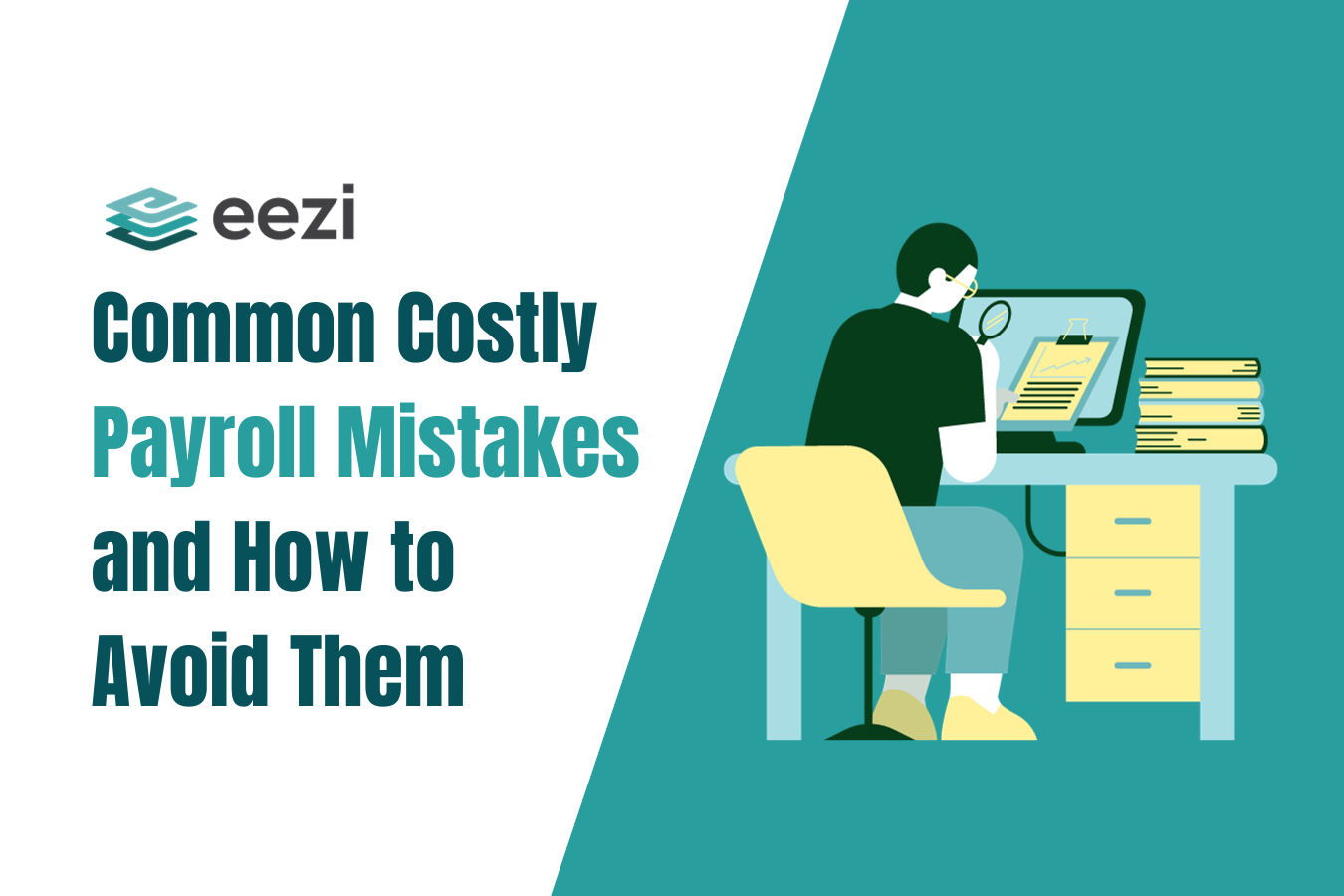Here are some of the common payroll mistakes that can become costly for your business.

Managing payroll is challenging, even for experts. Payroll mistakes are all too common, especially if you run a small business without a professional bookkeeper or payroll skills. These errors, though small, can have a significant effect on other aspects of your company.
Getting familiar with the most typical payroll mistakes is a great starting step in preventing them in your company. Moreover, knowing the effects is also crucial because they might just make or break your business.
Think of the long-term effects. Challenges such as low employee retention, tax difficulties, legal troubles, and other difficulties can arise from recurrent payroll errors.
There are a few steps you can take to prevent payroll issues and handle payroll properly. However, the best course of action is to use automated payroll software to assist in your payroll process and eliminate errors.
In this article, we’ll look at the costly payroll errors, their effects, and how to prevent them.
What are the common errors in payroll?
One of the first things you learn as a business owner is how to pay people. You pay your staff a salary or an hourly rate since they are what make your company run.
Payroll processing can be difficult and time-consuming, and mistakes are common to make. However, those errors can turn serious. You can lose workers or face severe tax penalties.
Here are the most common payroll errors that you should not ignore:
Failing to record employee hours
It is simple to overlook which hourly employees performed what tasks and for how long if there is no time-tracking system in place.
This usually results in payroll errors like improper tax forms filing, missed payments, and pay calculation errors. These factors can all have a lasting impact on your company.
But the issue goes beyond money. The management of resources, projects, and employee morale can all suffer from not tracking staff hours.
Planning for the future is difficult when you’re unsure that your billing and payroll are accurate. Additionally, it may result in problems with employee trust and accountability.
Disorganized or incomplete keeping of records
Your company may also suffer negative effects from disorganized payroll records or poor record keeping. At best, it adds unnecessary complexity to your administrative tasks.
In the worst-case scenario, you’ll be unable to prepare for an audit. Additionally, it may lead to increased labor expenditures, poor leadership, and dissatisfied workers.
Overlooking overtime pay
You may have to deal with more than just an angry employee if your overtime compensation calculations are inaccurate or you fail to account for them. Businesses that don’t properly pay overtime risk being hit with significant fines and interest.
In accordance with overtime rules and payroll laws, you must pay all non-exempt employees overtime wages and accurately calculate overtime pay following relevant laws.
Miscalculating pay
Any employee may find an inaccurate payroll upsetting, especially if it results in lost or late payments—or worse, having to refund money.
Inaccuracies also waste time since you’ll need to put in hours locating and fixing them on top of the five hours that business owners or HR professionals normally spend processing payroll.
Employee trust may be damaged by incorrect pay calculations, which may even place them in a difficult situation. Employees may struggle to pay their dues while waiting for their correct paycheck.
Both paid and hourly workers are subject to pay mistakes. The most typical instances include:
- Making errors when processing retroactive payments.
- Underpaying or overpaying workers.
- Failing to pay workers on time.
- Incorrectly calculating benefits deductions or other payroll deductions.
- Paying employees incorrectly while they are on leave.
Inputting inaccurate employee data
When adding employee data, there is a lot of room for mistakes, which can lead to improper payments and Bureau of Internal Revenue (BIR) red flags. This is particularly typical for employment companies that use separate onboarding and payroll processes.
Always verify that the information provided throughout the onboarding process is accurate.
- Full name
- Dates of employment’s start and termination
- Address
- Hourly pay
- Gross pay
- Tax file numbers
Misclassifying employees
Employees who are incorrectly classified may get the wrong compensation, which could result in either an overpayment or underpayment of salaries.
Making the wrong call regarding whether an employee should be excused from overtime is among the most frequent misclassification mistakes. Unless they are exempt employees, they are required to get overtime pay under the Labor Code for any hours worked in excess of 40 in a workweek.
A non-exempt employee may lose out on overtime pay if their classification as exempt puts your company at risk for Labor Code-related penalties.
When workers are labeled as independent contractors instead of employees, a payroll error commonly occurs. Researching previous payroll records and making retroactive payments or other changes to employee pay are frequent results of misclassification errors.
What Is the Impact of Payroll Processing Errors?
Payroll mistakes can have major impacts on companies of all sizes. These negative effects include monetary losses, legal problems, reputational damage, and employee turnover.
By being aware of these risks, you can take measures for your company. Whether you work in human resources or manage a small business, protecting the company and your staff demands a complete comprehension of the dangers posed by payroll errors.
Decreased employee morale
Morale among employees is a challenging subject. Being upset is effortless, and getting over it can be challenging. Payroll mistakes frequently bring on lowered morale and decreased output.
Moreover, employee dissatisfaction can affect the entire workforce if they believe their boss is not treating them fairly or with respect. Consider the effect of new policies or structural changes on employee morale if you observe a decline in performance following their implementation.
A mistake on an employee’s paycheck may result in them leaving your business. They might find themselves unable to afford to stay, which could lead to a loss of competence that would be bad for the worker and burdensome for your company.
Monetary losses
The loss of money is the most visible effect of a payroll miscalculation. The inability to pay for necessities like groceries or rent will have an adverse effect on your employees’ way of life if they don’t get their paychecks.
They might even decide to abandon your business in favor of one where they are paid promptly.
Additionally, you can be subject to fines and penalties if an employee makes a claim against you alleging unpaid overtime hours or other payroll mistakes.
Negative reputation
The reputation of your company is among its most valuable assets. It is imperative to protect it at all costs since it has the power to make the difference between success and failure. Payroll mistakes can harm your reputation in a number of ways:
- Negative testimonials on review websites.
- Sales decline due to bad publicity.
What is payroll correction?
A payroll correction is a process that takes place outside of your regular cycle to fix a mistake made in a prior payroll.
Time is important when resolving most payroll errors, which is why businesses frequently choose to run a payroll correction or off-cycle payroll run in certain circumstances.
While it is easy to fix payroll errors in your regular payroll run, it’s crucial to ensure you do it following all applicable state regulations. Some places have regulations regarding how promptly you must send the reimbursement to make up for a mistake, for instance, if you underpaid an employee.
It might be okay to hold off on the correction payroll until your next scheduled run. It pays to double-check that your correction complies with the labor laws.
Read more: Tips on managing payroll for small businesses

How to avoid payroll errors?
Each of the aforementioned mistakes can be avoided using a variety of strategies, but we’ve provided our top recommendations. By including these in your payroll procedure, you may prevent errors from occurring and improve the speed, simplicity, and accuracy of payroll.
1. Organizing Your Existing Records
It’s time to go over everything and make sure you have all the information you need about your staff if your pay records aren’t full. Their social security numbers and any other information that might have an impact on their income are required.
2. Create a Checklist for the Payroll Process
When using the tried-and-true checklist, you will never go wrong. Even though they have software to help with their operations, payroll administrators still have a lot to keep track of.
When using a checklist, they can go through each stage of the payroll procedure once to ensure that everything is accurate.
Additionally, you might wish to maintain a list of all new hires, adjustments to pay and deductions, and other adjustments in one location that is arranged by pay period.
When preparing the paycheck for that period, you can go over each list to ensure all the changes were appropriately entered into your system.
3. Invest in the Best Payroll Services
What’s the best strategy to prevent payroll mistakes from damaging your business? Invest in HRIS and payroll services that work well together.
The right HRIS, such as eezi, will maintain and update crucial employee data, such as salaries, hours worked, account numbers, and withholdings, and then convey these updates to your payroll system, doing away with the necessity of double entry.
The best payroll software should also automate the most time-consuming procedures and sync with your HR system. Running reports, filing taxes, giving out pay stubs, and other tasks are all made simple by payroll software.
Provide the Proper Paycheck at All Times – Automated Payroll Software by eezi
While mistakes can occur occasionally, there are proactive measures you can take to reduce and even completely avoid some of the most common payroll mistakes.
With the help of the eezi integrated payroll system, you can create a successful payroll system, maintain compliance, and give your employees payments free of mistakes.



